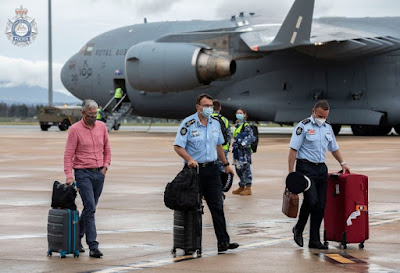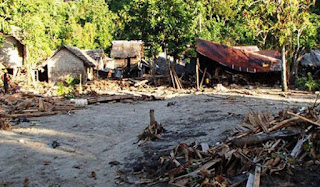LOSS & DAMAGE EMINENT FOR SOLOMON ISLANDS AT COP23
BY GEORGINA KEKEA
Bonn, Germany
THE Solomon Islands Delegation to the Climate Change Conference in Germany are bringing to the table for discussions some very key priority areas for the country and the Pacific as a whole. Speaking to the Solomon Islands media in Bonn, Germany, Permanent Secretary for the Ministry of Environment, Climate Change, Disaster Risk Management & Meteorology, Dr Melchior Mataki said they have already identified the key areas they would like to see make progress in this conference. The 4 key areas which they have identified are; the global action for reduction of gas emissions, a clear pathway for the Paris Agreement, loss and damage and the fourth one is for the adaptation fund be made a mechanism for the implementation of the Paris Agreement.
Bonn, Germany
THE Solomon Islands Delegation to the Climate Change Conference in Germany are bringing to the table for discussions some very key priority areas for the country and the Pacific as a whole. Speaking to the Solomon Islands media in Bonn, Germany, Permanent Secretary for the Ministry of Environment, Climate Change, Disaster Risk Management & Meteorology, Dr Melchior Mataki said they have already identified the key areas they would like to see make progress in this conference. The 4 key areas which they have identified are; the global action for reduction of gas emissions, a clear pathway for the Paris Agreement, loss and damage and the fourth one is for the adaptation fund be made a mechanism for the implementation of the Paris Agreement.
 |
| Solomon Islands delegation to COP23 with 2 Officials from PIFS (Photo by Jared Koli) |
In this list of key areas for Solomon Islands, what is very crucial at this point in time are the mainstreaming of loss and damage associated with climate change impacts in developing countries that are vulnerable to adverse effects of climate change. Dr. Mataki said ‘if we lose our islands for example, it will be difficult for us to regain what we as a country had lost’. He said at the moment, this is not a priority area for most of the developed countries and discussions on this topic are still on the surface.
He said each country has their own agenda but in the end, there has to be some sort of agreement or understanding and for the Solomon Islands, these 4 main issues are the ones they would like to see some clear progress made on after the COP23.
‘We have to align ourselves to the overall work that every parties want to go through with. However these are the areas which we see as very important for us to focus on and to see that some clear directions on how to address these issues are discussed in the COP23’. Dr. Mataki said ’whilst a lot of the talk at the COP23 are on climate finance, translating what is being said and agreed on in these meetings are the most difficult’.
‘How can we use the outcomes of these meetings to help our people in our communities? The finances being discussed in these meetings are not easy to tap into like going to the banks for loans which are easy to obtain. All these climate finances has conditions attached to it which makes it difficult for governments as these conditions are very strict. All along we have to access these resources through a third party which are called the implementing agencies’, Dr. Mataki said.
Solomon Islands recently lost five islands due to rising sea level from the effects of climate change and just in August this year (2017) the Premier of Malaita province, Peter Ramohia had raised his concerns in the country’s local newspaper, Solomon Star on the relocation of Walande and Fanalei islanders whose islands are submerging due to the rising sea level.
 |
| Fanalei homes overlooking what was once a taro plantation (Photo: Jo Currie, The Spinoff) |
Some of the islanders in Solomon Islands affected by climate change are described as living in borrowed time. Land is also a problem in the Solomon Islands and for some, relocation is not an option as they have no where else to go.
 |
| Dr. Melchior Mataki (Photo: SPREP) |
Dr. Mataki said all the big words used in these development meetings are meaningless to the rural people in communities affected by the impact of climate change. Dr. Mataki said discussions had just began and as the meeting draws to a close, thats where all the intense negotiations will take place and they are hoping that developed countries will take into consideration the issues which small island states like Solomon Islands are bringing to the COP23.
The UN Climate Change Conference is said to be the next big step for governments to implement the Paris Agreement that was enforced November last year, 2016.
Fiji is host to the COP23 with its Prime Minister, Frank Bainimarama as President of this meeting. The Climate change conference that commenced on the 6th of November will conclude on the 17th of November.
ENDS///



Comments
Post a Comment